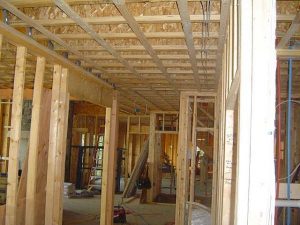How to be Your Own General Contractor, and if you Should
By Mark J. Donovan
|
|
Unless you have home building experience and construction management skills you should probably not act as your own general contractor. There I said it. Right off the bat.
Remodeling a home or building a home addition is a huge endeavor and takes a lot of specific knowledge and communication skills. Acting as your own general contractor also requires skills with working with and managing various trades and subcontractors that is not easy to do. |
Why Being Your Own General Contractor is so Difficult
Each subcontractor runs his or her own operation and thus marches to his or her own tune. As a result, it can be challenging to get contractors to show up to the jobsite when you want them to, and to keep to their original quotes. A general contractor, on the other hand, has the experience to better manage them.
Also, a general contractor is viewed by sub-contractors as a good source for future work so they are more likely to execute on time and budget.
With you acting as your own general contractor, the subcontractors know there is no follow-on business with you after the project is completed. So they are much more apt to use you and your project as filler work, when things get slow for them.
Yes, you acting as your own general contractor can save you some money, and thus it is a tempting proposition. However, if you lack the experience in managing such a project, expect for a great deal of exasperation and annoyance. Also realize that most likely will not end up saving as much money as you would have liked. In some cases, the project could go so poorly that you may end up spending a lot more money than if you hired a general contractor from the getgo.
| Also, it is important to be aware that a subcontractor will much more likely give a general contractor a discount for his work, rather than you acting as your own general contractor, as an incentive for the general contractor to hire him/her for future projects.
Yes, the general contractor will keep some of the savings for himself, but the homeowner will likely benefit as well. I have personally acted as my own general contractor on numerous home building and remodeling projects, and it is not my profession. |

Get this Room Addition Bid Sheet to learn how to hire the right general contractor. |
What type of Background do you need to have to Be Your Own General Contractor
I’m an electrical engineering by education and career. However, I acquired a great deal of experience as a young man building homes and home additions while working for my father.
So when I bought my first home at 23 years old I purchased it unfinished. Though the home was brand new the upstairs was completely unfinished. All it had was the exterior walls and they were not insulated or sheetrocked.
I acted as my own general contractor, and also did much of the actual construction work myself, including the framing, electrical, plumbing, heating, insulating, tiling, and even the sheet rock.
I ended up flipping the home two years later and repeated the process once again. I then went on to build a room addition and a separate garage addition on my next house, and then acted as my own general contractor building a vacation home.
| So suffice it to say, I’ve been around the block when it comes to managing subcontractors and getting them to show up to the jobsite per the plan and sticking to their original quotes.
Admittedly, it involved a lot of pestering and cajoling to get them to do their job, and many frustrating days. However, the projects always got done nearly on time and budget and it was always a profitable venture. |
 |
So again, I warn those who attempt to act as their own general contractor who have no previous construction experience or managing subcontractors experience. Being your own general contractor is somewhat akin to selling your own home.
There’s a lot more work and headaches to it than you think, with the exception that the financial payback is not as rewarding. I have some experience there as well, as I am a licensed real estate agent in the state of New Hampshire.
If you decide to act as your own general contractor, be prepared to have to address construction defects with subcontractors and deal with disputes between you and them. You may also very likely have to deal with disputes between sub-contractors. Plumbers and framers are often at odds with one another because, for example, plumbers don’t hesitate to cut floor joists to run their plumbing pipes.
When this type of example happens, often building inspectors will insist that the framing be fixed or beefed up while doing the rough plumbing inspection. This requires the framing subcontractor to come back to the jobsite, or more likely you making the fixes yourself.
| The smaller the size of your home construction project, the more likely you can manage the project.
For example, having a deck or patio constructed typically just involves one or two subcontractors. For this size project, then yes, being your own general contractor is possible. Or should I say, have a more likely positive outcome. |
|
Even a fairly straightforward kitchen remodeling project can be managed by the take-charge homeowner, as much of the work, including the cabinets and countertops installation, is done by just two or three subcontractors.
Being Your Own General Contractor on Large Construction Projects – Not Recommend
However, when you get into major room additions, or in the construction of a new home, it is best to hire a professional general contractor. Both projects require a large array of subcontractors that takes a lot of planning and coordination.
Another consideration when acting as your own general contractor is that you will need to make sure all of the building permits are pulled, the requisite inspections are done when required, and the occupancy certificate obtained. You will also need a complete set of building plans to obtain your building permits.
Moreover, you will need to deal with the general cleanup of the jobsite and providing temporary dumpster and toilet services. You will also need to deal with the ordering and delivery of materials. You will not want all the materials required for your home addition or construction project to show up at the jobsite at once. So you will need to work with the building material company to work up a phased delivery schedule.
If you decide to act as your own general contractor, make sure to get a least three quotes for each aspect of the home construction project. This includes; excavators, foundation installers, framers, plumbers, electricians, insulation installers, drywallers, painters, finish carpenters and HVAC installers.
Also make sure to check references and confirm that they are licensed and insured. Don’t always select the lowest bidder. Weigh the reference checks and understand what materials will be used with each proposal.
Often it is the middle priced bid that is the one to go with. Also make sure you understand their availability to see if it lines up with your schedule. If at all possible include start and complete dates in the various contracts with the subcontractors. You will also need to obtain liability insurance and material jobsite theft insurance during the construction.
To conclude, there is a heck of a lot of things to think about when being your own general contractor on a major home remodeling or construction project. If you don’t have previous experience in the home construction business and managing subcontractors, I highly advise against it. Though the dream of obtaining significant cost savings is attractive, the reality is you will most likely not save very much, if anything at all. And quite frankly, acting as your own general contractor could cost you more in the end, both in money and frustration.
For more help on building a home addition, see HomeAdditionPlus.com’s Home Addition Bid Sheets. Our Home Addition Bid Sheets provide you with the knowledge and information on how to plan a home building project, and what to look for when hiring contractors. They also include detailed cost breakdown tables and spreadsheets for estimating your own new home construction building costs.
Free Home Addition Price Quotes with No Obligation!
Fill out our 3-5 minute quick and easy form, and receive a free price quote on a house addition from one of our prescreened and licensed home addition contractors. This process is free and there is no obligation to continue once you receive your house addition price estimate.
